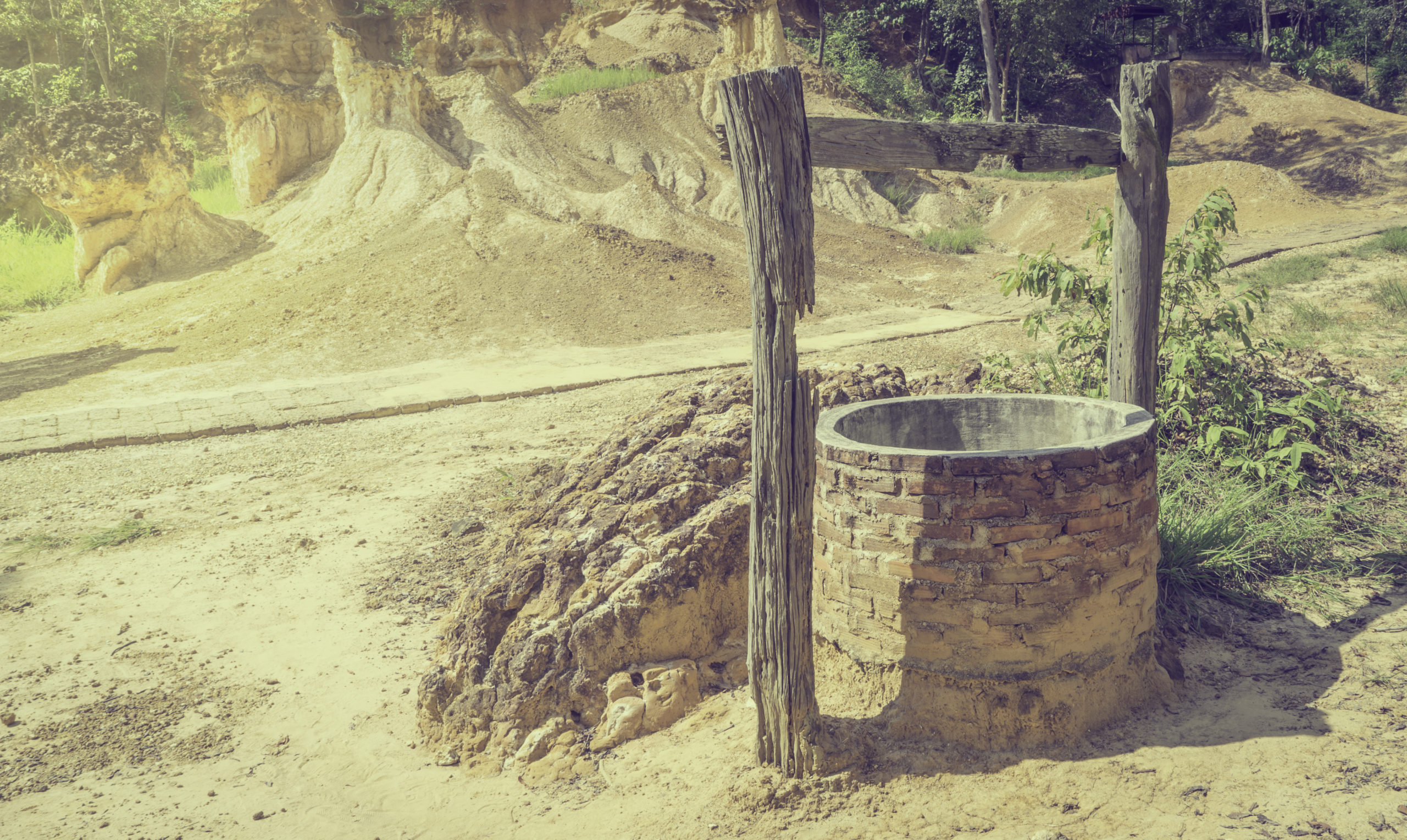Jesus said to her, “Everyone who drinks of this water will be thirsty again, but whoever drinks of the water that I will give him will never be thirsty again. The water that I will give him will become in him a spring of water welling up to eternal life.”
John 4:13-14
Have you ever felt so guilty and ashamed you’ve wanted to bury your head in a hole and hide from the world? When something regrettable happens to you–or when you’ve done something you really regret–the last thing you want to do is face judgmental stares and unkind gossip from others. Most people would avoid public humiliation like that at all costs.
Worse still than being hated by the people in your own social circle, is if your own social circle was already hated by everyone else around. It would be as if you were an outcast to the outcasts, hated and doubly-hated on all sides, with no one to turn to and nowhere to hide. Can you imagine that shame? Maybe you can even relate.

John 4 gives us the perfect example of a woman in the very same situation…
A Little Background History About the Samaritans
In Jesus’s day, there was a group of people living right in the middle of Israel called the Samaritans.

The Jews really hated these people. Many years before, Israel had sinned greatly against God so He had allowed the Assyrians to invade Israel and carry many of the Jews out of the promised land. Even worse, the king of Assyria brought foreign people into Samaria and allowed them to settle there, right between the northern and southern parts of Israel.
These people, the Samaritans, had intermarried with some of the Jews who had remained in Israel during the exiled period. They believed in God, but since they were a mixed group of people from different cultural backgrounds, and mostly had stories handed down without a share in the Israelites’ blood lineage, history, or experiences, they had a different perspective of Him. Their version of the story was somewhat contrary to the Jews’ and they created their own holy books, built a different temple, worshiped at a different mountain, and came up with their own perception of Israel’s history.
Needless to say, the Jews didn’t appreciate the Samaritans much.

They didn’t like these strangers who were brought into their home and took up residency when they had been exiled by a foreign king. They didn’t like that those same Samaritans had intermarried with their own ancestors and “perverted” their blood line. They didn’t like that those people recreated the history they had experienced firsthand and made it their own. They didn’t like the Samaritans one little bit. So, these Samaritans were ostracized in Israel. Their own little group remained shunned together, sandwiched between the upper and lower portion of the Jews’ promised land.
As we’ve already discussed, the Pharisees disdained Jesus, His mission, and His ministry. They were getting riled up against Him, so Jesus decided to leave town to keep the tension down. He wasn’t ready to deal with the Pharisees or reveal His divinity to them, so he departed from Judea (in the southern portion of Israel) to go to Galilee (in the northern portion) to get away.
He had two options: take the Jews’ common path, which was the long way around Samaria to avoid potentially “being defiled” by contact with the Samaritans, or walk straight through.
Jesus, being an example of true love and acceptance, decided to walk through Samaria. When he arrived at a town called Sychar, he came to a well and sat down to rest. His disciples hurried to town to buy something to eat and left Him there alone. This was around noon in the unimaginably hot, exhausting, desert heat, so Jesus was tired.
Suddenly, a Samaritan woman approached. This is where the story gets interesting.
The Woman at the Well
Since the days were so hot there, most women came early in the morning or late in the evening to draw their water from the well. Picture the locker-filled hallway of your high school where the popular crowd gathered to gawk at others, and different societal circles walked and talked to their friends…only in the desert by a well with jugs of water rather than textbooks and backpacks.

You know someone who wouldn’t feel very comfortable or welcome there? The type of person we discussed in the beginning of this lesson who felt shame and guilt, and wanted to avoid the judgment of their peers. So, here comes this woman at noon, in the hottest part of the day, when she knew no one else should be around. She was avoiding her social circle at all costs. She was an outcast to the outcasts.
However, there she finds the living Son of the Creator of the whole world…the only person ever born who was truly capable of judging her sin. Of course, she didn’t realize that right away.
Jesus asked her to give him a drink from the well and she was obviously surprised, because she questioned him, “How is it that you, a Jew, ask for a drink from me, a woman of Samaria?” (John 4:9, paraphrased).
She was accustomed to the Jews taking a long walk around Samaria just to avoid coming in contact with a Samaritan like herself because to deal with a Samaritan meant total defilement! Now, this Jewish man was not only speaking to her, a sinful woman from Samaria, but asking her for a drink.
“Jesus answered her, ‘If you knew the gift of God and who it is that is saying to you, ‘Give me a drink,’ you would have asked him, and he would have given you living water’” (John 4:10).
Living Water and Judgement
The woman was now even more confused. She basically said, “Dude, you have nothing to draw water with and this well is deep. Where do you plan to get that so-called ‘living water’?” (John 4:11, my own words).
Jesus said to her, “Everyone who drinks of this water will be thirsty again, but whoever drinks of the water that I give him will never be thirsty again. The water that I will give him will become in him a spring of water welling up to eternal life.” The woman said to him, “Sir, give me this water, so that I will not be thirsty or have to come here to draw water.” (John 4:13-15)
Bless her heart. She was still confused and thought He was talking about actual water rather than a metaphorical thirst, but the poor girl didn’t want to have to ever come back to that well again and risk facing the judgment of her peers there. If this man could offer her water that would keep her from thirsting again or needing to return to the well, she was desperate for it.
Our sweet Jesus knew her heart, and he knew her pain. He could feel her guilt and shame.
Jesus said to her, “Go, call your husband, and come here.” The woman answered him, “I have no husband.” Jesus said to her, “You are right in saying, ‘I have no husband; for you have had five husbands, and the one you now have is not your husband. What you have said is true.” (John 4:16-18)
Ah, there it is. The truth. The reason for this woman’s public ridicule and humiliation. She had been through five failed marriages, and now she was cozying up with a man she wasn’t married to.

She was a sinner in the eyes of everyone around her, and she was greatly looked down upon because of it. But, not by Jesus.
The woman realized Jesus was special, and she thought he must be a prophet. Wanting to learn from him, she asked him, “Our fathers worshiped on this mountain, but you say that in Jerusalem is the place where people ought to worship” (John 4:20).
Jesus said to her, “Woman, believe me, the hour is coming when neither on this mountain nor in Jerusalem will you worship the Father. You worship what you do not know, we worship what we know, for salvation is from the Jews. But, the hour is coming, and is now here, when the true worshipers will worship the Father in spirit and truth, for the Father is seeking such people to worship him. God is spirit, and those who worship him must worship in spirit and truth.” (John 4:21-24)
Jesus pretty much told her it really didn’t matter what mountain was considered holy or where people worshiped. He explained that God wanted worshipers whose hearts were true, and that was what actually mattered.
“The woman said to him, ‘I know that Messiah is coming (he who is called Christ). When he comes, he will tell us all things’” (John 4:25).
I picture her heart racing while she said this. I believe that deep down inside, she knew. Her eyes were opened, and she realized just whom she was speaking to. And that’s when it happened…
“Jesus said to her, ‘I who speak to you am he’” (John 4:26).
This is important… Our loving Jesus chose this publicly-ridiculed, sinful, shameful, broken, guilty, socially-shunned woman to reveal himself to.

One of his disciples came back and was surprised to see him talking to a woman, but didn’t questioned him. The woman dropped her water jar there and ran back into town to tell all the people about Jesus. Suddenly, her water didn’t matter… Her guilt and shame didn’t matter… Her desire to avoid all people and be alone didn’t matter. She had just met the Savior of the world, and she wanted everyone to know.
“She said to the people, ‘Come, see a man who told me all that I ever did. Can this be the Christ?’” (John 4:29).
The people listened to her, and they went out to meet him.
Many Samaritans from that town believed in him because of the woman’s testimony, “He told me all that I ever did.” So when the Samaritans came to him, they asked him to stay with them, and he stayed there two days. And many more believed because of his word. They said to the woman, “It is no longer because of what you said that we believe, for we have heard for ourselves, and we know that this is indeed the Savior of the world.” (John 4:39-42)
Because of this woman, once too ashamed to even walk near people to fetch a pail of water, many people (men, women, rich, poor, great, powerful, small, humble, sinful, or virtuous) all came to believe in Jesus and they publicly recognized her for introducing them.
This woman was no longer the talk of the town for negative reasons. She was known now as the woman who Jesus chose to reveal his divinity to. She was the woman who brought the Savior of the world to meet them.

Not only did this woman find forgiveness and salvation through Jesus, but her testimony brought countless others to Christ. What she had gone through in her past was absolutely necessary to bring all of those people to salvation. If she had not gone through the hard times she had experienced, she wouldn’t have been at the well at that time, and she wouldn’t have met Jesus.
Her life was not a mistake. She might have been an outcast to the outcasts, but she was loved and valued by God. This woman was deliberately chosen for an incredible purpose. Everything she had gone through was for a reason, and God used it for His divine purpose.
Jesus forgives Divorce.
Jesus forgives “Cohabitation.”
He forgives us when we judge others, but we really shouldn’t do it.
Whatever you’ve gone through, whatever sin you’ve committed, whatever shame or guilt you feel from it… Your testimony serves a great purpose. Not only are you chosen, loved and valued by Jesus, God wants to use you to bring His news of salvation to others.
When in your life have you felt judged and ostracized?
Do you know anyone who might currently feel like an outcast? Can you think of anyone who might feel shunned, guilty, or ashamed? Maybe someone you know has been going through a hard time, or maybe you just feel like they could use a little encouragement. Who comes to mind? Friend, God wants you to drop your water jug and leave it at the well. Whatever guilt and shame you’ve been carrying around with you, throw it down. Jesus loves you and He’s chosen you. Run back into town, lift your eyes to those who have brought you down in the past. Exclaim the news about Jesus far and wide. God wants to use you to introduce others to Jesus today. Your testimony can bring others to salvation.

Add a comment
0